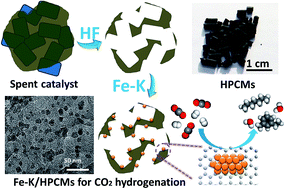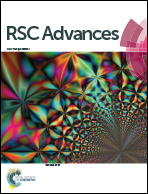Facile one-step synthesis of hierarchical porous carbon monoliths as superior supports of Fe-based catalysts for CO2 hydrogenation†
Abstract
A versatile strategy involving one-step desilication of coke-deposited spent zeolite catalyst was successfully developed to prepare hierarchical porous carbon monoliths (HPCMs). Such a strategy avoids the use of hard or soft templates and carbon sources, eliminates high temperature carbonization, simultaneously minimizing the emissions from processing spent catalysts. The resulting carbon exhibits a controlled morphology such as three-dimensional networks, hollow spheres or nanosheets, a high degree of graphitization and a multi-level porous structure. Its mesopore (2–50 nm) surface area can reach 522 m2 g−1 and both mesopore and macropore (50–350 nm) volumes are more than 1.0 cm3 g−1. Such hierarchical porous carbon was found to be a superior support for minimizing the nanoparticle size and enhancing the synergism of the Fe–K catalyst for promoting CO2 hydrogenation. Using such a catalyst results in increased conversion of carbon dioxide and enhanced selectivity of high value olefins (C![[double bond, length as m-dash]](https://www.rsc.org/images/entities/char_e001.gif) 2–4) and long-chain hydrocarbons (C5+).
2–4) and long-chain hydrocarbons (C5+).


 Please wait while we load your content...
Please wait while we load your content...